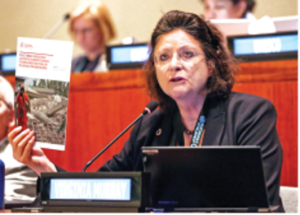 This is the tenth in the series of short statements from candidates in the coming CODATA Elections at the General Assembly to be held on 27-28 October, 2023. Virginia Murray is a candidate for the CODATA Executive Committee as an Ordinary Member. She was nominated by the UK.
This is the tenth in the series of short statements from candidates in the coming CODATA Elections at the General Assembly to be held on 27-28 October, 2023. Virginia Murray is a candidate for the CODATA Executive Committee as an Ordinary Member. She was nominated by the UK.
It is an honour to be nominated again by the UK. To me CODATA’s National Members provide an important link to wider research communities. I would like to facilitate stronger engagement between the UK’s research community and the activities of CODATA and its other members. I would also use these links to enhance my contributions to CODATA’s Executive Committee. I engage closely with The Royal Society and UK Research and Innovation, who support the UK’s national membership of CODATA. I am also a member of the recently established UK International Research Data Initiatives Forum. This forum aims to enhance UK engagement with international initiatives relating to research data policy and practice, including CODATA.
CODATA’s mission and role to connect data and people to advance science and improve our world is important as ever to help address global grand challenges, including in my own domain of global disaster risk reduction.
Data is critical for the implementation of the landmark UN agreements of the Sendia Framework for Disaster Risk Reduction 2015-2030, the Sustainable Development Goals (SDGs), and the COP21’s Paris Climate Conference. With disasters increasing in intensity and severity globally, improving risk information across all types of hazards is critical to enhance our capacity to anticipate, prevent and respond to disaster risks from the local to the global scales. One barrier to sharing and using data effectively has been the lack of standardized definitions of hazards and a lack of guidance on the full range hazards such as hydrometeorological, biological and technological hazards and societal that need to be addressed in risk management.
The United Nations Office for Disaster Risk Reduction (UNDRR) and the International Science Council (ISC) jointly established a Technical Working Group (TWG) in 2019 to identify the full scope of all hazards relevant to the Sendai Framework and the scientific definitions of these hazards. I was invited to chair the TWG with strong CODATA Executive Committee representation and partnership. The TWG with invaluable participation from CODATA colleagues and the project secretariat engaged with scientists in many organisations and UN agency scientific partners to find out how, via consensus building, an all hazard list could best be developed. Outputs included the UNDRR-ISC Hazard Definition and Classification Review – Technical report released in July 2020, and the Hazard Information Profiles: Supplement to UNDRR-ISC Hazard Definition & Classification Review – Technical Report released in October 2021.
In section 5.3.1, The Report of the Midterm Review of the Implementation of the Sendai Framework for Disaster Risk Reduction 2015-2030,, this statement is made:
‘Work undertaken with the International Science Council (ISC) [and UNDRR] and the engagement of more than 800 partners from scientific institutions, including national scientific advisers [with strong CODATA Executive Committee engagement], the research funding community and numerous international organizations, led to the groundbreaking Sendai Hazard Definition and Classification Review Technical Report. The report, which contains 302 hazard information profiles, is a key tool for building common definitions for developing comparable data sets for monitoring and review. It provides a common set of hazard definitions to governments and stakeholders to inform approaches, policies and investments, whether integrated in sectoral interventions or DRR strategies and actions.’
Again, with strong CODATA Executive Committee representation, have been invited to chair the UNDRR/ISC Steering Group for reviewing and updating the Hazard Information Profiles for the UN Global Platform on Disaster Risk Reduction to be held in May 2025.
Using the UNDRR/ISC Hazard Information Profiles and working in close collaboration with CODATA Executive Committee and IDPC I am now also engaged in supporting Data Policy in Times of Crisis – CODATA, The Committee on Data for Science and Technology – something that, to me, is vital to consider building our data to manage disasters.
The implementation of this and related work remains a vital contribution that I hope, as an ordinary member of the CODATA Executive Committee, I could continue to contribute if elected for the next two years, alongside supporting CODATA to deliver the important wider priorities identified in its Strategic Plan 2023-2027.
More widely, my current roles are as a public health doctor committed to improving health emergency and disaster risk management as well as data access and transparency for effective reporting. I was appointed as Head of Global Disaster Risk Reduction (GDRR) for UK Health Security Agency (formerly Public Health England) in April 2014 and am now a development lead for the new UKHSA Centre for Climate and Health Security. I am a member of the Integrated Research on Disaster Risk (IRDR) scientific committee and Co-Chair of IRDR’s Disaster Loss Data (DATA). I am a co-chair of the WHO Thematic Platform Health and Disaster Risk Management Research Network, and by working in collaboration with this network, I am one of the editors of the WHO Guidance on Research Methods for Health and Disaster Risk Management, updated 2022. I am a visiting/honorary Professor and fellow at several universities.
